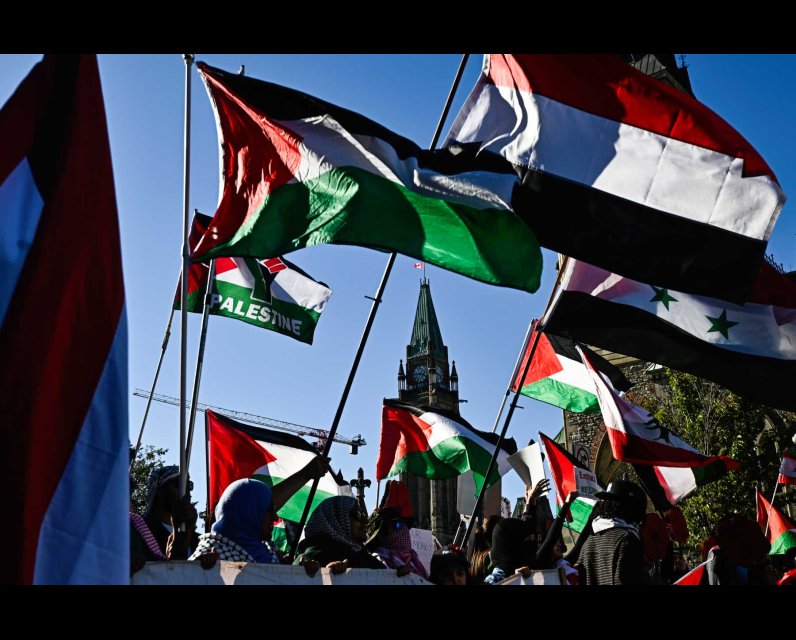What Can Canada’s Recognition of Palestinian Statehood Achieve?

In July, when Prime Minister Mark Carney announced Canada’s intention to recognize a Palestinian state, his statement should have been viewed as an act of moral courage, similar to Brian Mulroney’s stand against South African apartheid in its time. The move effectively acknowledges that all peoples of the land “between the river and the sea” have the same inalienable rights to self-determination, safety, and security.
Along with the UK, France, and Australia, Canada intends to formalize its recognition at the eightieth session of the United Nations; in doing so, these countries will join a group of 147 others that have already recognized a Palestinian state, even though one is yet to officially exist (except at the UN, where Palestine is recognized as a non-member “permanent observer state”). The statement, which marked a significant shift in policy, was sure to draw fire—whether for going too far or for not doing enough.
Mainstream Jewish organizations were immediately critical. The Centre for Israel and Jewish Affairs posted on X: “Extending recognition absent real change on the ground is a recipe for another failed Palestinian pseudo-state controlled by terrorists.” Similarly, but with a bit more nuance, the Canadian branch of the Association of Reform Zionists of America penned a letter to Carney, voicing their concern that recognizing Palestinian statehood without a negotiated agreement between Israelis and Palestinians “undermines the very principles upon which a just and lasting peace must be built,” ending their letter by saying that “the destiny of The State of Israel is bound up with the destiny of the Jewish people everywhere.”
Also weighing in, in a letter with multiple endorsements by Jewish community leaders, B’nai Brith Canada chastised the prime minister, writing, “Though the hasty recognition of a Palestinian state may appease some on Canada’s political fringes, it is beyond the pale that such a serious reversal in Canadian foreign policy has been made at a time when Parliament is not in session.” Some went so far as to call the recognition “a slap in the face to Canada’s Jewish community.” It’s worth noting that progressive organizations, such as JSpace Canada, supported the statehood announcement.
For some pro-Palestinian advocacy groups, the recognition of a Palestinian state would do little to stop the horrors of Israel’s assault on Gaza; if anything, it could be seen as a distraction. These groups largely focused instead on a report from Arms Embargo Now, a collaborative investigation by a number of organizations showing that Canadian-made arms shipments have continued to make their way to Israel, despite a ban declared by the Canadian government last year. (The federal government disputes this claim.) Such groups were asking for sanctions to be placed on Israel.
These disparate reactions reflect the ongoing and intensifying polarization between the diaspora communities. Among Jewish organizations, the seemingly impulsive reaction to any recognition of Palestinian realities is that Jewish ones will be negated. These groups demand, as a prerequisite, that any statement on Palestine condemn Hamas and focus on the return of hostages. This is not a surprising reaction to the trauma of October 7, 2023, and the videos of emaciated hostages.
Similarly, Palestinian supporters have demanded that the calamity in Gaza be recognized as a genocide as part of any discussion on the conflict. They challenge Israel’s legitimacy by calling it a settler-colonial state and accuse it of committing apartheid. This, too, is not a surprising reaction to the destruction of Gaza and the near-daily images of starving children and blown-up bodies.
But these tribally driven responses among Palestinians and Jews in the diaspora reflect an “us or them” mentality, seeing suffering as hierarchical, focusing on one’s grief to the exclusion of the other’s. Sadly, much of the rhetoric from organized groups since October 7 has shown a reluctance to respond to all human suffering.
We should be able to pressure Israel to end its blockade on food and medicine entering Gaza and to safeguard civilians without it being assumed that we don’t care about the Israeli hostages or Jewish safety writ large. We should be able to condemn Hamas’s October 7 attack without taking away from the legitimate right of Palestinians to seek freedom and resist their oppression. We should be able to view the recognition of Palestinian statehood as a shared call to justice.
The Israel–Palestine discourse can be defined, in part, as a struggle over who are the greater victims and the greater perpetrators. A friend recently sent us an essay on moral reasoning. Its author, Clark Foerster, posits that “‘terrorists’ and ‘colonizers’ aren’t people with inner lives but existential threats.” Statements from both the Israel and Palestine camps too often use these terms, ensuring the other is seen only from the lens of danger rather than possibility. Allowing themselves to be drawn inward rather than considering another narrative diminishes the reality of the other’s suffering.
A shift toward the recognition of Palestinian rights by Israel’s long-time allies in the West will not break this cycle of polarization, but it is important. It appears to be a last-ditch effort to save what little is left of the possibility of a two-state solution for Israel–Palestine. And while to many Palestinians, the gesture is too little, too late, it has nevertheless been welcomed as a means to push back against Israel’s genocidal actions in Gaza and the repeated assaults on Palestinians in the West Bank.
It indicates that the Palestinian experience has become better known and it reflects a shift in public opinion—a deeper and more widespread understanding that Palestinians in the West Bank, Gaza, and East Jerusalem have been living under a brutal occupation for the past fifty-eight years. And that, beyond a ceasefire, the suffering of Palestinians in Gaza and the West Bank will end only when they enjoy the same self-determination and the same freedoms as Israeli citizens.
The post What Can Canada’s Recognition of Palestinian Statehood Achieve? first appeared on The Walrus.
Comments
Be the first to comment